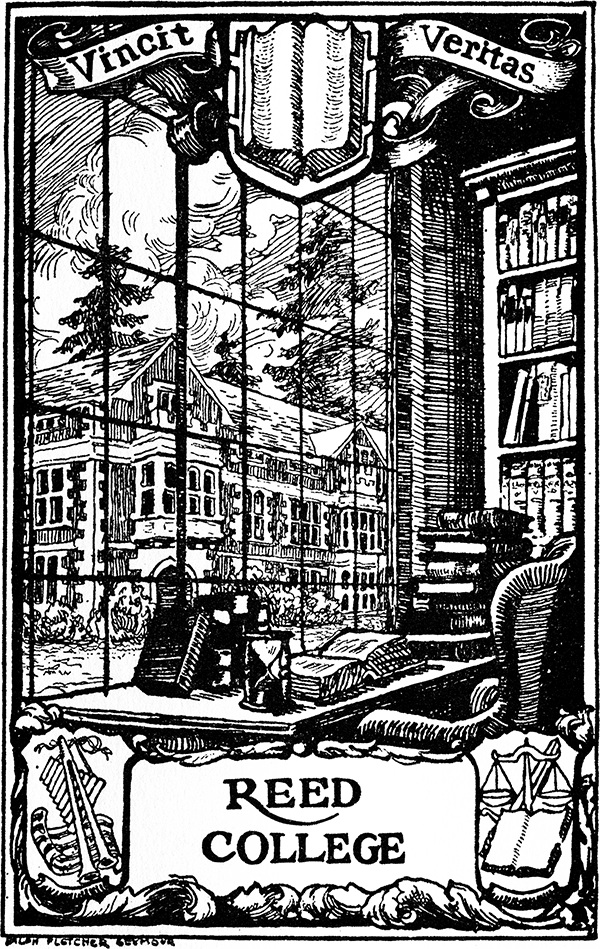President’s speeches, letters, and articles
Subject: Vincit Veritas
September 19, 2018
It is my pleasure to write to you this year in my role as acting president of Reed College. My principal goal during this time is to nurture and strengthen the values that have sustained and motivated the college over its 110-year history.
 Vincit Veritas (“Truth Prevails”) appears on a Reed bookplate that was designed by Chicago artist and printer Ralph Fletcher Seymour sometime between 1925 and 1933. I love the woodcuts produced during the college’s early years and have, in fact, enlarged this one for my office as a daily reminder of the importance of the idea behind these two words.
Vincit Veritas (“Truth Prevails”) appears on a Reed bookplate that was designed by Chicago artist and printer Ralph Fletcher Seymour sometime between 1925 and 1933. I love the woodcuts produced during the college’s early years and have, in fact, enlarged this one for my office as a daily reminder of the importance of the idea behind these two words.
While we find out whether the phrase has ever been proposed as an official motto of Reed College, I am using this idea to reflect on Reed’s role in understanding the now hotly contested word “truth.” After all, the academy was created in no small part to educate students to pursue truth and to produce graduates who would create a more just and productive world. It is no accident that many of the United States’ oldest institutions of learning include the word veritas in their official seal, some of which adorn Eliot Hall.
From my experience at Reed, I see several core commitments to educating students about truth-seeking. First, knowledge requires training, both in research techniques and
Structurally, Reed works to administer our core beliefs in at least four ways:
- Training: The college has long required a common introductory course in the humanities because we believe that all students must develop an understanding of analysis and argumentation. The college’s insistence that all students complete courses that teach the scientific method
stems from this same belief. As a report by Reed’s Science Excellence Advisory Council, made up of alumni and friends, noted: “Students must understand the scientific method, i.e., generating a hypothesis, testing it with controlled experiments, and developing a theory based on the outcome. They must be able to distinguish fact from belief from proof and distinguish scientific from nonscientific reasoning.” - Group learning: A great deal of learning occurs in group contexts, where significant efforts have been made to assemble people of different backgrounds and to gather a wide range of materials, with the goal of providing a complete picture of the problem at hand.
- Intentional governance structures: The college has developed on-campus governance structures based on the aspiration of Reed’s Honor Principle—which reads in part that community members “will respect others’ rights and persons [and] will take responsibility for the effect of their behavior on the college as a whole”—and a commitment to education that relies on the expertise of constituent groups, faculty, students, and administration. These procedures respect the differences of perspective and priorities while endeavoring, in the words of Bart Giamatti, to sustain a “free and ordered space.” While such procedures can move slowly and require a lot of work, they produce graduates who understand that truth can only be established and sustained through hypothesis, testing, argument, and counterargument. It is also important that these processes depend on all participants taking responsibility for the decisions made, actions taken, and their impacts.
- Assessment: Reed’s educational programs are evaluated on how well students demonstrate their mastery of the Reed curriculum’s core concepts and those of their major, including students’ ability to evaluate, analyze, and make compelling, well-supported arguments. These assessments occur principally through the milestones of the junior qualifying exam and the senior thesis.
But perhaps these times require more from us. It seems that there is a great deal new under the sun. Social media and advances in technology make it easy to capture and share images, thereby empowering individuals to an unprecedented degree. While these technologies have exposed acts of brutality and promoted important societal changes, they have simultaneously disrupted expectations about personal privacy. The country is increasingly divided by race, class, gender, politics, and economic power, with people reading very different blogs and feeds that tend to exacerbate these differences. Like many other institutions, Reed has greatly increased enrollment of students from historically underrepresented groups. But these students’ presence is only the first step to including them fully in the college.
In this context, truth risks becoming a shill for advocacy, or “weaponized,” as Justice Elena Kagan said when speaking about the First Amendment. Some groups seek to overwhelm skepticism not with persuasion but with megaphones. Those with alternative points of view can become fearful of speaking their minds, concerned about being “doxed” or outed for insufficient certainty or commitment. And some “self-evident” truths aim principally to further marginalize members of our society.
Simple solutions are likely not at hand, but that is in fact why Reed was created: to devote itself to the “intrinsic value of intellectual pursuit and governed by the highest standards of scholarly practice, critical thought, and creativity,” in the words of our mission statement. And our engagement and optimism
Truth-seeking remains a central purpose of Reed’s enterprise, and it is our intention to refine our already firmly developed structures in order to strengthen this fundamental institutional commitment. I appreciate and welcome your support in this endeavor.
Vincit Veritas,
Hugh Porter
Acting President